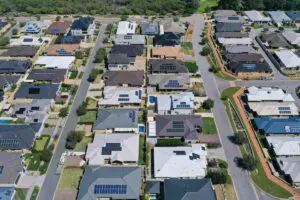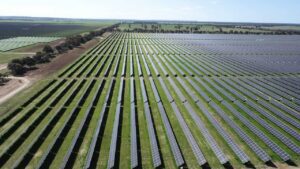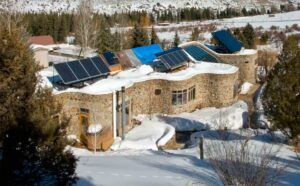A solar panel recycler says bans on solar panels from being dumped in landfill need to be Australia-wide so the country can reap the benefits from the “new kind of mining”.
Glass waste is banned from being exported but solar panels, which are 70-80 per cent glass, are not, says Neeraj Das, managing director of PV recycler Elecsome.
“It makes no sense to send these panels to landfill. They are too bulky,” he told RenewEconomy.
“And they contain very valuable resources.”
Victoria has banned solar panels from landfills, and Queenslanders have until 5pm on April 17 to have their say on a similar plan.
But a mandated recycling scheme would be a first for Australia, which trails Europe in that regard where rules have dictated since 2012 that 80 per cent of a panel must be recycled.
The Queensland government is also proposing to spend $250,000 on a committee to investigate solar panel recycling.
Awash with solar waste
The government estimates waste from old solar panels will rise to 17,000 by 2030 from both residential and large-scale power generators, from less than 1000 tonnes in 2019, if it doesn’t act.
The ban will be part of its $1.1 billion Recycling and Jobs Fund that seeks to divert 80 per cent of waste from landfill by 2030.
As the first solar farms begin replacing panels from 2030, Australia’s photovoltaic panel waste is expected to jump significantly.
The International Renewable Energy Agency (IRENA) says Australia will be throwing out between 30,000 tonnes and 145,000 tonnes by 2030. By 2040, that figure hits 450,00 tonnes.
Das says Queensland councils are already getting desperate for options for panel recycling.
The company has already spoken to three councils with landfills full of solar panels affected by weather and construction damage – the kind of damage that occurs during transportation over, say, unsealed roads, or during installation.
While construction damage only wrecks 1 to 3 per cent of all solar panels, given the number of large-scale farms being built in Australia Das estimates that number at around 3 million panels needing to be recycled or chucked away.
However, with landfills charging $2 a panel for disposal, the cost of recycling is still high. Elecsome charges $10 per panel now, but hopes to get that down to $3 once it can make more revenue from the recycled components.
Setting up a solar salvage industry
Today the solar panel recycling industry in Australia is necessarily small – there are few panels to recycle yet as seen by the minimal waste created by sun-loving Queensland in 2019.
Currently in Australia only about 17 per cent of a solar panel, or the aluminium frame and junction box, can be readily recycled, according to Sustainability Victoria. The glass, silicon and polymer back sheeting often are all wasted.
Elecsome, which can retrieve about 95 per cent of the materials in a panel, is set to launch its first factory in Melbourne in June.
Das says the factory costs about $8 million to set up and future factories, such as a possible Queensland edition next year, should be able to be rolled out within six months.
The beginnings of an industry is mostly in New South Wales (NSW) and Victoria where at least eight companies are based: Lotus Energy, Reclaim PV, PV Industries, SolaCycle, CMA Ecocycle, Solar Recovery Corporation (SRC) and Ecoactiv.
Scipher Technologies is the largest licensed e-waste recycler in Victoria and won $1.7 million from the NSW government to build a solar panel recycling facility in the Albury area.
SRC has three sites in Queensland, in Townsville, Biloela and Brisbane with each facility expected to take up to 180,000 panels a year.
Reclaim PV received a $130,000 grant in late 2020 from the Queensland government as part of the Resource Recovery Industries 10-Year Roadmap and Action Plan, and said in late 2021 it had approvals to build a recycling plant in Brisbane that was supposed to be running by the end of that year.










